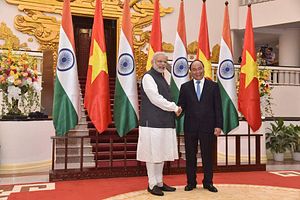India- China relations has been dogged by mistrust ever since the 1962 war. Relations improved considerably after the visit to India by Chinese President Xi Jinping in September 2014 and the Indian prime minister’s visit to China in May 2015. However, since then relations have once again hit a low point because of two major incidents.
First, India was unhappy when China blocked India’s membership in the Nuclear Suppliers Group, especially when it received overwhelming support from most of the NSG members, including the United States, U.K., France, and Russia. Second, China has repeatedly blocked India’s attempt to place UN sanctions on Pakistan-based militant Masoor Azhar, who was allegedly involved in the infamous Mumbai attack and also in last year’s attack on an Indian Air Force base in Pathankot. India has viewed both these developments with concern, and sees them as a deliberate attempt to negate India’s rise on the global stage.
Further, India has lately been concerned with the Chinese investment in various infrastructural projects, like ports, roads, and railways, in Pakistan, as well as China’s investment in Sri Lanka and Nepal. These moves are interpreted by India as a deliberate attempt to reduce New Delhi’s influence in its neighborhood.
In the past, India would have either ignored these developments or, at best, would have registered a mild protest. However, under the leadership of Prime Minister Narendra Modi, India is becoming more assertive, and has already initiated several measures to counter the growing Chinese influence in the region. Except for Pakistan, India has established good relations with all its neighbors. It has recently settled its border disputes with Bangladesh, a unique achievement. Indian businesses have shown their interest in setting up power projects and building roads and flyovers. India is also building a port in Chabahar in Iran, as a response to the Chinese investment in Pakistan’s Gwadar port which will give Beijing a foothold in the Indian Ocean, apart from boosting its exports to the Middle East and South and Central Asia.
Earlier, the United States with its “pivot to Asia” provided strong moral and military support to Asia’s smaller countries, which had dissuaded China from bulldozing its neighbors. Unfortunately, with foreign policy in flux, U.S. influence is on the wane in Asia. In fact, countries like the Philippines and Malaysia are now veering toward China to find a resolution to end their maritime disputes, as they are no longer sure about the United States’ ability to come to their rescue should China use arm-twisting tactics in the South China Sea. Similarly, other Southeast Asian countries, like Thailand, Laos, and Cambodia, unsure of the U.S. role, are now embracing China.
Vietnam, which has an ongoing dispute with China over the Paracel and Spratly island groups, as well as sovereign and jurisdictional rights in these waters, has responded differently. Hanoi has turned toward India to shore up its defense capabilities. Last year, India extended a $500 million line of credit with Vietnam. India has also agreed to provide Vietnam with Akash surface-to-air missile systems mainly to act as a deterrent to any possible aggression against Vietnam. China has warned Vietnam that it will not sit quiet if the deal goes through.
India should realize that providing surface-to-air missiles will not deter China’s ambition of expanding its influence in East Asia, as Vietnam can be no match for China’s military and economic superiority. China has already warned India to stay out of the South China Sea disputes, as becoming involved may deteriorate relations between the two countries.
It would not be prudent for India, which has a border dispute with China, to aggravate the situation. India also has a border dispute with Pakistan, which is seeing frequent shellings; it would not be advisable to open another front with China. With China building massive infrastructure in areas bordering India, China will have the upper hand if a low-intensity war takes place, a prospect that should be avoided at all costs.
We are now seeing that with the decline of U.S. influence, a maelstrom of uncertainty has taken place in the Middle East and Asia. In this changing geopolitical landscape, India should tread cautiously and avoid any friction with China. It is true that India’s aggressive design is in response to growing Chinese influence in both South Asia and East Asia, but New Delhi still needs to be mindful of the dangers of provoking Beijing.
K.S.Venkatachalam is an independent columnist and political commentator.

































